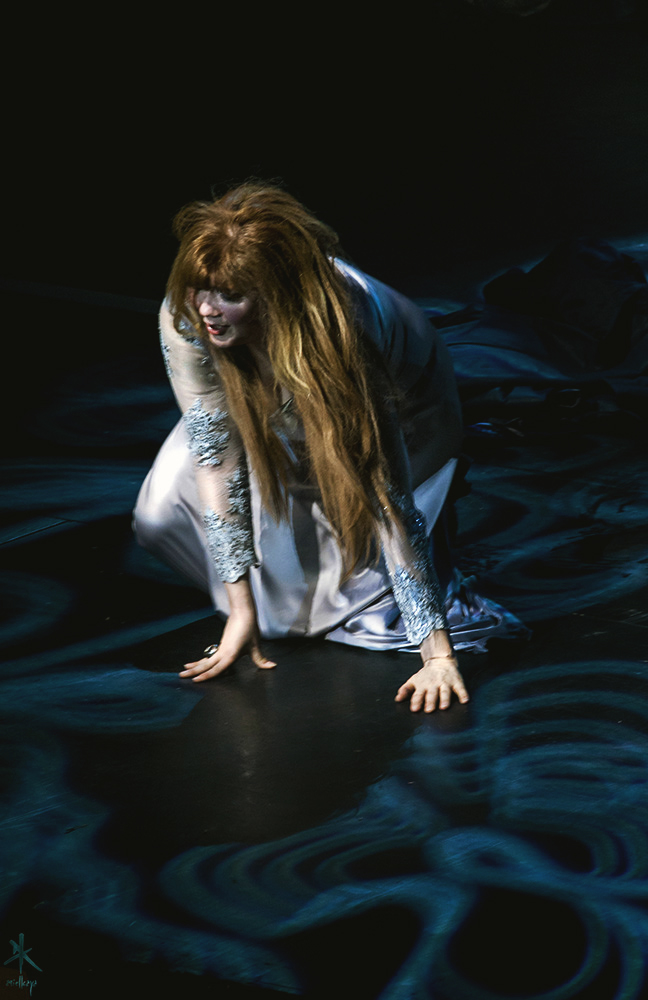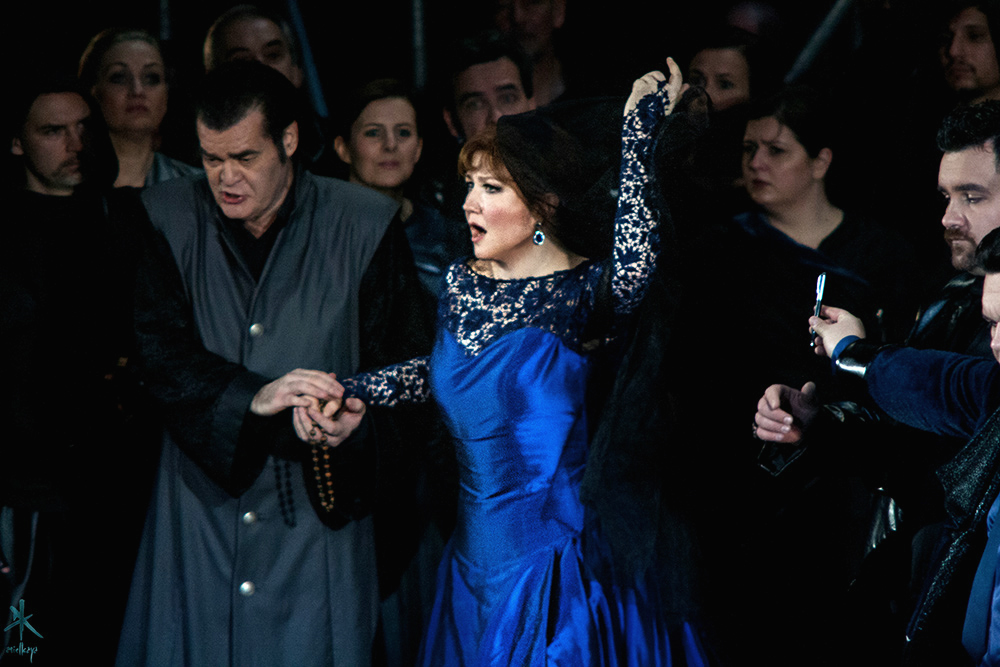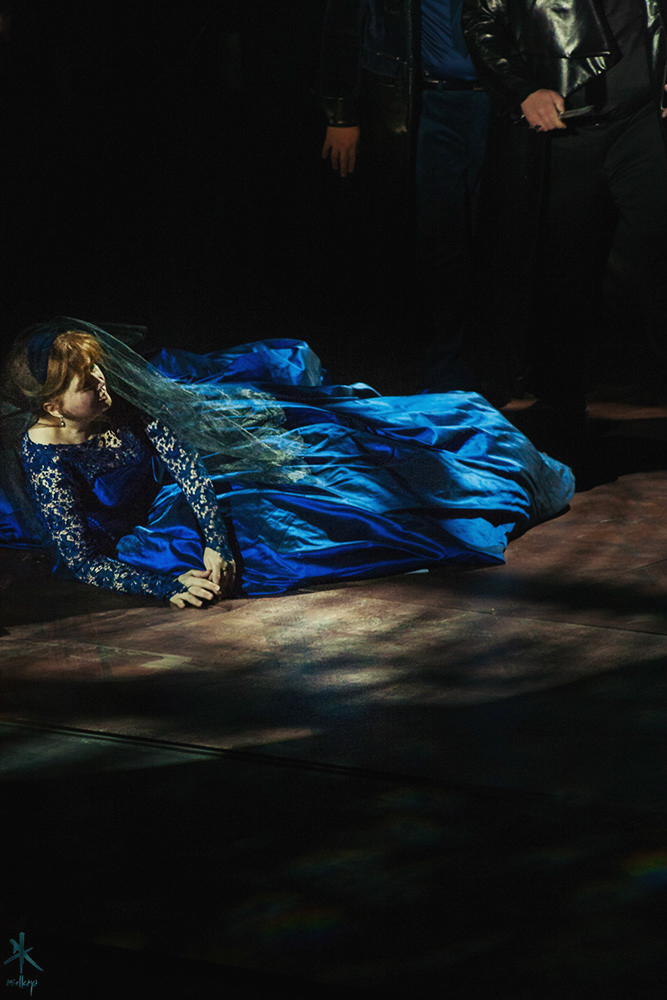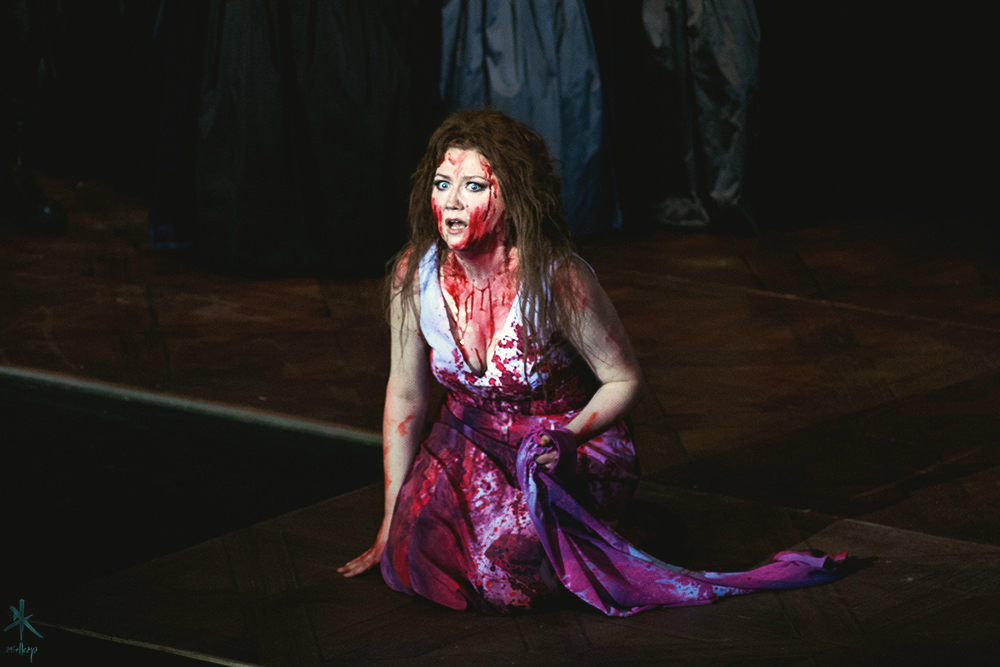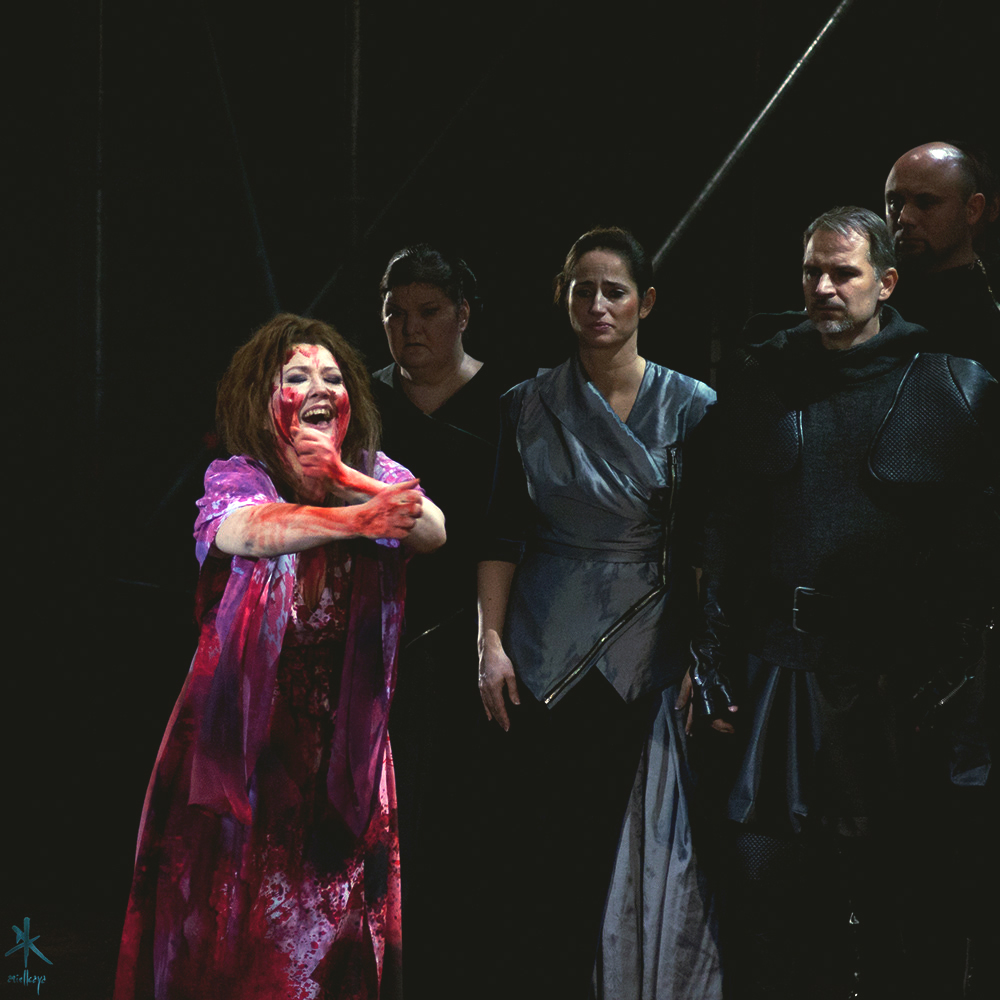“In the person of Klára Kolonits we got a wonderful Lucia (…) and this time I will not only praise her as I recently often do, but I will mention two things that are very rare in Hungarian State Opera… but she gave them to us. The first one is a “CD-sound” – often we feel, listening to an opera show, that ok-it’s beautiful, but it wouldn’t work as well on a cd. And Klára Kolonits is actually able to deliver a cd-like quality of sound on a live show and this is a wonderful, very big thing, very rare experience here in Budapest. By “CD-sound” I mean that there is no compromise on the quality. We get what we can imagine by the most beautiful Lucia-experience in our lives, it gets impersonated in the singing of Klára Kolonits. The other thing is even more crucial and personal: we, as critics, don’t go for opera shows because we want to hear something beautiful or less beautiful, but because we want something to happen with us on this show. And in the Lucia of Klára Kolonits it was possible to experience, that the show literally speaks about us, that it’s important got us, that we get something from life, that we actually understand something about life, because here and now Klára Kolonits sings Lucia. And this is even more unusual that belcanto as such is not really full of life, even within opera genre kind of sterile thing, that is not speaking about us directly. And this spoke about us and very much so. It was worth to see this show because Klára Kolonits sang Lucia. And especially because the Mad scene, which is the key point of the show, was sung in the original F major key, with an incredible virtuosity in the cadenzas.”
26th November 2016, “Új Zenei Újság”, Bartók Rádió, Ferenc László
“The title role’s confusing top moment is when Lucia, directly after having murdered her new husband, radiates with unearthly happiness. Klára Kolonits sings this part with even smoother legatos and sweeter colours, than the love duet. The spectator initially calms down, that this girl finally found her happiness – and then gets terrified, for it was possible only in a transcendental world, after committing a bloody murder. Kolonits is leisurely bathing in the more difficult than usual vocal part, in the interpreted woman’s fate. Her ornaments are balanced, her vocal runs follow the waves of her mood. And she’s bathing in blood as well – but it’s all based on the music and the drama. The trills symbolise the surreal world, the high notes brings her closer to divinity. (…)We knew of course, how spectacular singer is Kolonits. But this interpretation and the meticulously constructed arch of her singing are nonetheless striking. One simply cannot get used to her artistic greatness, its effect is always unpredictable, to confront it is always a cathartic experience. Kolonits’ exquisite singing revived an old custom: in the opera lovers’ circle it became fashionable to frequent the Mad Scene. The fans of the genre and the artists felt an irresistible yearning, from one evening to another, to hear the impossible once again and to express their enchantment towards the wonderful achievement. As the reports state, the favourite of the spectators from one evening to another rewarded them with impeccable singing, with newer and newer nuances and always crowned the part with a sweeping high F. All that brought a long, delighted ovations possible only on an opera stage. The essence of a fruitful dialogue between the singer and the role, the artist and the creator, the performer and the audience.
Kolonits, with her wonderful Lucia, signed up to the Hungarian opera history’s indelible interpretations. Filippo II of Székely, Renato of Svéd, Turandot of Marton, Bánk of Simándy – and her. Now everyone has to consider her right there and treat her accordingly.”
23rd December 2016, Tiszatáj, Márok Tamás
“Klára Kolonits in the title role not simply masterfully triumphs over the formidable part, but lives together with it. In her performance we can experience her tragedy as if it was our own, the overwhelming pressure because of family values. She guides us with analytical precision all the way from serene happiness (beginning of the second picture) until the moment before the tragedy (ending of the fourth picture), she dramatically portrays the frightening steps of a budding madness. This process obviously reaches its top in the Mad scene (fifth picture), but not only because of the fantastic singing, incredible virtuosity laced with held and touched high Fs, but because all this actually serves one thing: EXPRESSION. The Mad scene created a completely different dimension, beyond the missing set, internal situation at the opera house and the nuisances of the whole music environment – we got a final effect that demands an all-time respect. For the second show – if this is even possible – her production was even more concentrated, appointed and intense. If I could bring one thing from the year 2016 to my tiny personal opera island, it would be surely the Lucia of Kolonits.
We recently discussed a lot on what can be considered success and recognition in the opera world nowadays. The full ninety seconds of applause bursting in the middle of Mad scene is such a record that we will remember for a long time.”
26th November 2016, “Our own Solar System, our own Sun” momus.hu, Antal Z. Tóth
“This is a piece and a title role that require a performer who mastered equally the virtuosity of the singing technique as well as the drematic expression and great stage presence. This is not such an easy task, but this time the choice of Hungarian soprano Klára Kolonits came out to be the most fortunate.
Klára Kolonits is well known by the Hungarian public and myself I attended her performances many times and I always appreciated her. But here, in the role confided to her (Lucia) her talent was represented more than ever in its different aspects: the power of her voice which bears no aggresive tones, and in the same time is able to follow all the nuances, high and low passages with perfect intonation. But first of all, in the ability to pass from the most acrobatical vocalises (Mad scene) to the sweetest confessions and whispers (Verranno a te sull’aure). And all the time highly expressive, same in singing and in acting.
Of course the most awaited moment was the Mad scene. It’s rare in Budapest that a scene is interrupted by an ovation lasting more minutes, with bursting “bravos”. “
25th November 2016, francianyelv.hu, Pierre Waline
“Klára Kolonits starred as the eponymous Lucia. This dramatic coloratura soprano is one of the stars of Hungarian State Opera with her wonderful bel canto style and notes that spoke of acres of pain. As Lucia she is perfectly cast; fragile and girlish, splintering like glass when her heart is broken. But it is the famous madness scene in Act III that is the real challenge for this role. Kolonits gave Lucia’s descent into madness grace and beauty with her voice effortlessly gliding into those sweeping high notes which seemed to stretch into heaven itself. She at once spoke of beautiful love mixed with oceans of pain, as she danced in ever-flowing circles to the crowd of stunned onlookers. The awkward moment continues seemingly endlessly as her friends and family watch her first appearing happily crazy before descending into despair and finally collapsing on the stage. There is no need for dramatic scene changes as the characters surrounding Lucia become the set; shifting into an ever-changing composition, afraid and mystified by the sad Lucia and then the mad Lucia.
This extended aria, “Il dolce suono”, is immensely demanding for the lead soprano and is one of the most difficult arias in the soprano repertoire. Fragile Lucia has to sustain herself through Acts I and II to have the strength to whirl into her mad frenzy of Act III.”
25th November 2016, budapesttimes.hu, Kiára Árgenta
“There is a kind of (false) general opinion, that the belcanto operas and the virtuoso soprano solos found in them are a sort of cold and sterile matter – even comparing to the opera genre in general. Premiered in 1835, Lucia di Lammermoor can seem such a sterile matter as well at the first sight. But afterwards her comes a great singer, and from the way that the title part rings, we can undoubtedly understand that it speaks about yearning, hoping and fighting for escape, about a flight into madnes and in the end about decay of the very person. Such a great singer we found in Klára Kolonits, who not only portrayed Lucia as a victim, not only showed her whole spiritual world, but even as this vulnerable and disheveled angel she made her belong between us, in the storm of madness still human with her desires and battles.
The threat of violence, the desperation and collapse, but in the same tame also passionate happiness at the border of physical extasy – all this is in our hand’s reach, as Kolonits made us feel, through pure lines of her warmly coloured, extatic singing and acting composed of fine, sensitive gestures. And because of her, even as for the premiere the celebrations that interrupted the show in many points was exceptionally enthusiastic – a boisterous demonstration of the audience, exploded into applause.”
20th November 2016, Magyar Narancs, Ferenc László
“Then I got to hear the first cast, members of which decisively contributed to improve the whole show (proving that in the opera the singer is the most important factor). Obviously in this improvement it was Klára Kolonits who played the biggest part, who stands very close to perfection in her Lucia interpretation. Her voice sounds balanced in all registers, she has no problem with high notes even lying on the floor. Especially memorable is the fact, that not only the voice of the singer sounded naturally and radiantly even in the most difficult passages, but together with it she was able to project the madness in a believable way.”
9th December 2016, Opera-Világ, Kata Kondor
“It’s only fitting that I start by praising Kolonits, for indeed, her tour de force performance was the gem in an otherwise rather bleak night. Her affinity and mastery of bel canto was unquestionable: fully in command of her gleaming soprano, Kolonits negotiated the most difficult passages and tossed out high E flats with ridiculous ease. Her mad scene, acted out with eerie intensity, was nothing short of a masterclass. (…)Her performance was absolutely thrilling.(…)
With Kolonits, the Hungarian State Opera has a singer around whom an entire bel canto revival could be built. She would certainly be capable of bringing the great Donizetti heroines to life.”
19th November 2016, bachtrack.com, Orsolya Gyárfás
“Klára Kolonits sang the title role: her fantastic interpretation and beautifully coloured singing enchanted the audience. Her highest achievement is the fact, that the challenging high notes and ornamentations are never a goal: she identified herself deeply with the role of Lucia and all this served only dramatic expression.”
14th December 2016, Kortárs Online, Zoltán Péter
“In short: as we expected Klára Kolonits was very successful in the title role, celebrated with neverending applauses after her arias. The artist herself is a miracle, which I already wrote but it’s impossible to mention it too many times. The high and higher notes appear most graciously. (…) Yesterday evening in another bravura role (after her solo evening in October and Bátori Mária) – Klára Kolonits was dominating and gloriously shining on stage, as intended by the composer. Her strong point is that we can see – even next to the daring coloraturas or even through them – the fragile woman who wins our complete sympathy while she’s fluttering between two fires. (…) However we put it – this portrayal of Lucia is not only high, but also deep.”
19th November 2016, mezeinezo.blog.hu, Zsuzsanna Makk





